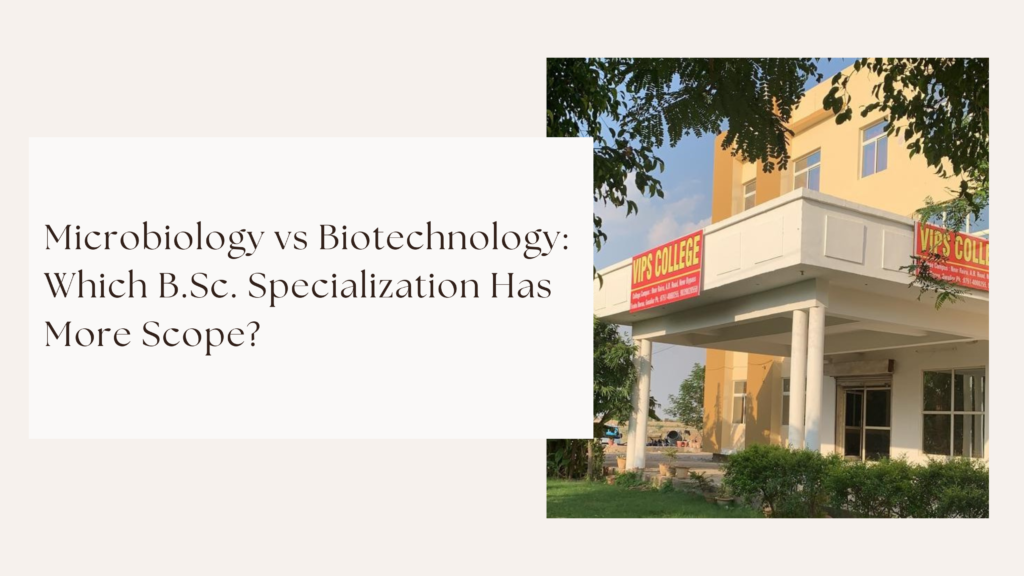Stuck between choosing B.Sc. Microbiology and B.Sc. Biotechnology? You’re not alone. With the growing demand in the life sciences sector, students are often confused about which course will give them better job prospects, higher salaries, and more exciting career paths.
This blog will help you make a smart and informed decision. We’ll compare Microbiology vs Biotechnology, covering everything from career scope, subjects, job roles, to B.Sc. Biotechnology salary and B.Sc. Microbiology salary. Whether you’re aiming for research, industry jobs, or higher studies, this guide has you covered.
Microbiology vs Biotechnology: A Basic Comparison
Understanding the Core Difference
B.Sc. Microbiology focuses on the study of microscopic organisms such as bacteria, viruses, fungi, and protozoa.
B.Sc. Biotechnology, on the other hand, uses biological processes and living organisms to develop products that improve our lives—from medicines to biofuels.
Key Focus Areas:
- Microbiology: Disease research, diagnostics, food safety, pharma labs
- Biotechnology: Genetic engineering, agriculture, healthcare innovation, industrial production
Both fields overlap in some areas, but your interest and career goals will shape the better fit.
Subjects in B.Sc. Biotechnology vs Microbiology
Course Content & Learning Outcomes
Understanding the subjects in B.Sc. Biotechnology and B.Sc. Microbiology helps in identifying your area of interest.
B.Sc. Biotechnology Subjects:
- Molecular Biology
- Genetic Engineering
- Biochemistry
- Environmental Biotechnology
- Industrial Biotechnology
- Plant and Animal Biotechnology
B.Sc. Microbiology Subjects:
- Microbial Physiology
- Immunology
- Medical Microbiology
- Virology
- Food Microbiology
- Environmental Microbiology
Tip: If you enjoy lab work, genetic tech, and innovation, go for Biotechnology. If you’re passionate about microbes and disease control, Microbiology may be the better path.
Career Opportunities After B.Sc. Microbiology
Jobs, Salaries & Industry Demand
A B.Sc. Microbiology in India opens up several entry-level jobs across industries.
Top Job Roles:
- Microbiologist
- Lab Technician
- Quality Control Analyst
- Food Safety Officer
- Clinical Research Associate
Average Salary:
Freshers can expect around ₹2.5 to ₹4 LPA. With experience or M.Sc., salaries can go up to ₹6–10 LPA.
Career Opportunities After B.Sc. Biotechnology
Jobs, Salaries & Global Reach
Biotechnology has broader applications in sectors like pharma, agriculture, and environmental sciences.
Top Job Roles:
- Biotech Research Associate
- Genetic Counselor
- Biotech Lab Technician
- Clinical Data Analyst
- Biomedical Engineer (with further studies)
Average Salary:
The B.Sc. Biotechnology salary ranges from ₹3 to ₹5 LPA for freshers. Advanced positions can earn ₹8–15 LPA or more with a Master’s or PhD.
Which Has More Scope in India?
Comparing Long-Term Growth: Microbiology vs Biotechnology
Biotechnology generally offers wider career scope due to its multidisciplinary applications in health, agriculture, environment, and industrial processes.
Microbiology remains a solid option for niche specialization in pathology labs, research, and government sectors.
Key Considerations:
- Biotechnology has more innovation-driven job roles
- Microbiology has more diagnostic and testing-based opportunities
- Both can lead to M.Sc., Ph.D., or foreign university admissions
B.Sc. Microbiology vs B.Sc. Biotechnology: Pros and Cons
| Criteria | Microbiology | Biotechnology |
| Focus | Microorganisms | Application of biology |
| Job Opportunities | Moderate | High |
| Innovation Scope | Low | High |
| Research Options | Good | Excellent |
| Govt. Job Scope | Strong | Moderate |
| Global Demand | Growing | Very High |
FAQs: Microbiology vs Biotechnology
Q1. Which is better: B.Sc. Microbiology or B.Sc. Biotechnology?
If you are inclined toward innovation, technology, and multi-sectoral applications, Biotechnology has more scope. If you prefer pure science and diagnostics, Microbiology is a great choice.
Q2. What is the average B.Sc. Biotechnology salary?
Fresh graduates can earn ₹3–5 LPA. With experience or M.Sc., salaries can reach ₹10+ LPA.
Q3. Can I pursue M.Sc. after B.Sc. Microbiology or Biotechnology?
Yes, you can pursue M.Sc. in the same stream or even switch to allied fields like Bioinformatics, Genetics, or Biochemistry.
Q4. Are there colleges in Gwalior for B.Sc. Microbiology and Biotechnology?
Yes, several reputed Colleges in Gwalior offer B.Sc. degrees in both fields with lab training and placement support.
Q5. Is math compulsory for B.Sc. Biotechnology or Microbiology?
Usually, no. A background in biology is more important.
Conclusion
Choosing between B.Sc. Microbiology and B.Sc. Biotechnology depends on your passion, career goals, and long-term plans. If you’re looking for broader career opportunities, global scope, and interdisciplinary work, Biotechnology may be your best bet. If you’re drawn to lab research, diagnostics, and the world of microbes, Microbiology is perfect for you.




